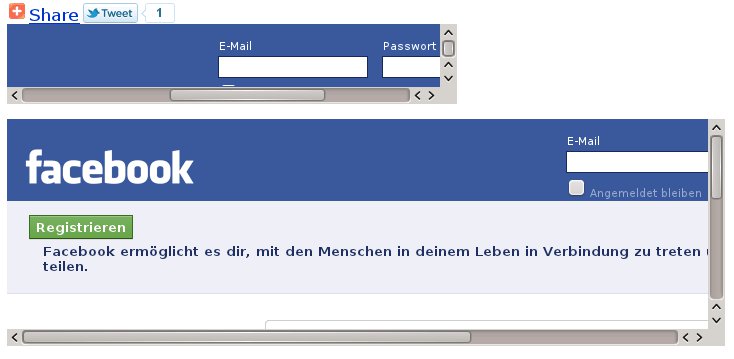03.02.11
Posted in Apple, Security, Windows at 10:26 am by Dr. Roy Schestowitz
Secrecy is not security

Summary: Our latest accumulation of security problems found in proprietary operating systems
-
Windows PCs have been under siege for 20 years. What a difference those two decades make.
Back when Windows was young, viruses scampered from system to system, occasionally deleting files — which could almost always be retrieved — and putting up dialog boxes with inscrutable contents, like the numeral 1. Nowadays, Windows malware locks up your data and holds it for ransom. It manipulates your PC into launching attacks, mines files for credit card numbers and passwords, and sets nuclear centrifuges to whirl with wild abandon — nasty stuff.
-
-
Permalink
 Send this to a friend
Send this to a friend
03.01.11
Posted in Apple, Java at 2:24 am by Dr. Roy Schestowitz

Summary: Apple takes further baby steps towards inappropriate conduct by removing Java runtime
Apple keeps removing software that competes with Apple and can help advance Android at the expense of hypeOS (Objective-C). The Register explains why it’s reasonable to say that Apple removed Java after initial clues and the Java founder’s claims that Steve Jobs is a liar. To quote: “Apple has removed the Java runtime from its upcoming Mac OS X Lion, according to a report based on firsthand experience with a preview release of the OS.
“Appleinsider reports that the latest developer release of Mac OS X 10.7 Lion removes both Java and Rosetta, the package used to run PowerPC code on Intel-based Macs. But according to the fanboi news site, Lion includes a mechanism for automatically downloading the latest version of Java for the Mac.”
“So I no longer hate Apple products,” says this other new article. “In fact I use them every day. But I never feel like I own them. More like I’m renting them from Skynet.”
Apple is not about user choice and user control. It merely turns customers into consumers and repeatedly it bans its competitors using platform control. █
Permalink
 Send this to a friend
Send this to a friend
02.27.11
Posted in Apple, GNU/Linux, Microsoft at 3:46 pm by Dr. Roy Schestowitz

Summary: Apple and Microsoft are unable to catch up with Linux/Android while RIM is excluded by most predictions and Symbian is put to rest by a Micromole, Elop
THE sales of hypePhone are reportedly falling (depends on which data points can be trusted) and the Linux-based Android is already a #1 player in some markets. Apple is starting to sue companies for selling Android (using software patents, which are the lowest form of competition) and breaking some rules too on the face of it. “For years,” says Murdoch’s press, “Apple relished its reputation as a scrappy outsider, fighting to stay alive in a world dominated by Microsoft Corp.’s Windows monopoly. But a quiet recent hire by the Cupertino company suggests it realizes how much that picture has changed.”
“The BBC Hard At Work” is the latest essay from TechBytes’ Gordon, who addresses the problem with the MSBBC’s hype offensives (at taxpayers’ expense):
I totally understand that proper journalism needs money, and that small local news organisations simply can’t afford to employ an army of journalists. They rely on news wire sources upstream like Press Association for their content. I have no issue with that, the BBC screw a LOT of money from every household with a TV license partly on the promise of well funded unbiased journalism. They have no excuses.
Regarding the latest news about the MSBBC (“Ipad 2 will be launched at the BBC”), The Inquirer takes an excellent and hilarious approach. To quote one joke:
So that’s a no, then. We think that there is a greater chance of Steve Jobs embracing open source, or fragmentation as he likes to call it, after all the stories we’ve written about the fruit-themed cappuccino company.
Needless to say, Microsoft’s futile efforts at mobile presence are a complete joke, especially after the bricking of phones [1, 2, 3], which was a fiasco that still gets a lot of attention.
The above headline should never need to be written. A company should never “brick” or render any product that a customer paid for useless. The company should replace the product if this happens accidentally and pay a fine for seriously inconveniencing the customer.
And exactly what mechanism is in the phone that “bricks” it and renders it useless anyway?
Microsoft’s spin is very weak, blaming connectivity. A robust update mechanism is more resilient than this, so the excuse doesn’t pass muster. It may not be valid, either. The platform has a very small number of users, so it’s hard for Microsoft to justify satisfactory QA. Based on the status quo, nothing but patents can stop mobile Linux now. █
Permalink
 Send this to a friend
Send this to a friend
02.25.11
Posted in Apple, GNU/Linux, Marketing, Microsoft at 4:15 pm by Dr. Roy Schestowitz

Picture published by Linux wizard Gerard Braad (we were unable to find the original source)
Summary: Ending the illusion that two proprietary operating systems which have stores ‘glue’ them to hardware are actually the only game in town
WE do not regularly post funny pictures (sometimes we link to them to avoid copyright infringement), but the above is the exception because it says so much in just one single image and it can be left to people’s imagination and interpretation.
A Microsoft booster from the MSBBC has just published an article comparing Apple and Microsoft stores, obviously promoting the illusion of just two bogus and proprietary choices, just like in politics (where both/all major parties belong to Big Business). Gordon — perhaps replying to this man (Rory) — wrote about “The Microsoft Store”, noting that the game of brands can deceive a lot of people and the corporate press will just play along.
People have a perception of “Mac v PC” not “Apple OSX v Microsoft Windows”. The branding is there, and Microsoft are the generic no-namers that are as common as muck. A “PC” means “Personal Computer”; ie the OS and the hardware as a combo. This means that Macs are PCs, so are Windows PCs, so are Linux PCs. They are all just a combo of hardware and OS allowing for software to be installed, hardware connected to personalise the device to perform certain tasks.
Most non-techy people don’t know what Windows, Internet Explorer etc is even if they use it all day at work. They switch on their PC, go make coffee, catch up with some gossip and come back to wait for Windows to boot up. They are oblivious to the Microsoft brand. This is not a fertile ground to open a store around that brand, specially when it puts it in people’s faces that it’s another “me too” clone of an Apple store without the sparkle.
Real PCs are GNU/Linux (or no-OS); bundled PCs may only have Windows on them. Sadly, however, we live in an age with an implicit collusion where just about any PC gets delivered saddled with an operating system which people do not need. For the first time in ages, today I needed to approach a Windows-running (or Windows-saddled) PC for a minute as it had a printer connected to it and this was an awful, awful experience. It is very clear to longtime GNU/Linux users that they are extracting a lot more value from their PCs (hardware). Will ‘mainstream’ press like the MSBBC give GNU/Linux fair coverage? Or will the chicken-and-egg cycle carry on? That’s the cycle where the MSBBC says that almost nobody uses GNU/Linux and actively plays a role in ensuring nobody can use it (c/f iPlayer fiasco), let alone knows about it. A lot of today’s MSBBC management consists of former Microsoft UK executives. We’ll write about media distortion by Microsoft later tonight. █
Permalink
 Send this to a friend
Send this to a friend
02.24.11
Posted in Apple, Asia, GNU/Linux, Google, Patents at 6:29 am by Dr. Roy Schestowitz

Summary: Problems for Apple in China, trouble in a market increasingly dominated by Android, and antitrust actions
THESE TIMES are wonderful for Linux, but usually it’s not called “Linux”, it’s just called something like “Android” or “Red Hat” and even “Ubuntu”. Linux is everywhere and it commoditises the platform much to the regret of Apple and Microsoft. They have their own problems. Security-wise, Apple’s proprietary software still fails right now (this time it’s hypeToons) and the “iPhone [is] ‘becoming less popular’” based on other new reports.
Research from the uSwitch.com mobile tracker found that HTC handsets, which are made in Taiwan, were doing particularly well.
The firm compiled a ranking of the most prized smartphones, based on web searches and sales, and HTC were in each of the top three places with its Desire, Desire HD and Wildfire models.
Apple has already started suing HTC using software patents (a sign of Apple getting miserable) and it falls under antitrust scrutiny these days. Rik Myslewski says that “Apple ‘greed’ tax spreads beyond music, movies, magazines”:
Apple’s recently enacted “give us 30 per cent of your subscription revenue” dictum is metastasizing beyond online magazines, newspapers, music services, and video apps, ensnaring at least one software-as-a-service app as well.
Steve Jobs’ App Store police have rejected the iOS version of Readability – an online service that allows you to read online stories stripped of ads, Flash, and other distractions – saying the app’s developers provided no way for Apple to take its cut of subscription revenue.
The irony is that Apple uses Readability’s open source code to enhance its own Safari browser. And Readability creator Rich Ziade isn’t too happy about the turn of events.
Apple increasingly behaves like a thug and “‘Poisoned’ Chinese workers turn to Apple for help,” says the MSBBC this week. To quote: “Chinese workers injured while making touchscreens for mobile devices, including iPhones, have written to Apple asking it to do more to help them.
“Some 137 workers suffered adverse health effects following exposure to a chemical, known as n-hexane.”
Yes, just what Apple needs right now… █
Permalink
 Send this to a friend
Send this to a friend
02.23.11
Posted in Apple, GNU/Linux, Google, Microsoft at 2:22 pm by Dr. Roy Schestowitz
(ODF | English/original)
Resumen: Junto con nuevos socios como Nokia, Microsoft està tratando de garantizar que el vídeo en el Internet y el mercado de teléfonos inteligentes sean lo más tóxicos posible para Linux.
Hace unos días escribimos acerca de la prohibición de Licencias de Código Abierto por parte de Microsoft[http://techrights.org/2011/02/18/wp7-forbids-the-use-of-mono/]. Despues de algún control de daños (muy esperado), nos enteramos que Microsoft EXCLUYE las licencias que estan en CONTRA DE LAS PATENTES DE SOFTWARE[http://www.itwire.com/business-it-news/open-source/45259-some-open-source-licences-banned-from-windows-phone-marketplace]:
En concreto sí prohibió la GPLv3(Licencia Pública General v3), Affero GPLv3 y LGPLv3(Licencia Pública General Menor v3). Cualquier código que se distribuya bajo los equivalentes de ESTAS tres licencias tampoco están permite en el Mercado de Microsoft (Marketplace).
Como era de esperar, él refuerzo de Microsoft Peter Bright[http://techrights.org/2011/01/19/ars-technica-misdirection/] lanza un ataque a la GPL (Licencia Pública General)[http://arstechnica.com/microsoft/news/2011/02/windows-phone-marketplace-bans-the-gpl-and-the-app-store-should-too.ars]. Si es malo para Microsoft, ‘entonces’ es malo para Peter también. Estan en el Mismo equipo.
Mientras tanto, se sospecha que Microsoft quiere las patentes de Nokia, (tal vez su deseo es “Tirar un CPTLN” de Nokia, al igual que lo que hizó con Novell). El acuerdo probablemente puede ser algo más que Vista Phony 7 [1[http://techrights.org/2010/10/21/ina-fried-pseudo-journo/], 2[http://techrights.org/2011/02/11/elop-pours-gasoline/], 3[http://techrights.org/2011/02/14/legal-action-and-nokia/], 4[http://techrights.org/2011/02/15/nokia-swpats-strategy/]], Que no puede hacer otra cosa que perjudicar a Nokia. Lo que fue sin duda un acuerdo terrible. Para citar algunos fragmentos de las declaraciones de ese “acuerdo[http://www.businessinsider.com/nokia-heres-why-we-jumped-off-the-burning-platform-into-the-frigid-north-sea-chose-windows-phone-7-2011-2]” “La historia de Nokia de innovación en el espacio del hardware, en la escala del hardware a nivel mundial, su fuerte historia de creación de propiedad intelectual y sus activos en navegacion de primera…”
En combinación con este article[http://www.techeye.net/business/swingin-stephen-elop-confirms-nokia-ms-deal-is-about-patent-protection], seguro que Nokia tiene planes maliciosos que incluyen las patentes, al lado de Microsoft. “Hay otros ecosistemas móviles”, dice el artículo. “Los vamos a interrumpir”–La única manera de hacerlo no es con mejores productos pero con patentes de software- muy ala Microsoft.
Interrumpir, ¿eh? Elop también dijo: “Yo no Soy un caballo de Troya”.
Es muy triste cuando usted tiene que decir algo como, “Yo no soy un caballo de Troya”, afirma Groklaw. Es algo asi como Nixon dijo : “Yo no soy un ladrón.” El refuerzo de Microsoft Matt Rosoff [1[http://techrights.org/2010/10/21/ina-fried-pseudo-journo/], 2[http://techrights.org/2010/10/12/msft-october-disaster/], 3[http://techrights.org/2010/10/12/msft-october-disaster/], 4[http://techrights.org/2010/11/03/pile-of-dead-microsoft-products/], 5[http://techrights.org/2011/02/08/ballmer-wants-to-reorganise/]]. Su análisis se baso en (y la fuente y foco de ese artículo es Elop mismo para impulsar Vista Phony 7)[http://www.reuters.com/article/2011/02/18/us-nokia-ceo-idUSTRE71H1BE20110218]. Cuando demostramos que Elop vendio todas sus acciones de Microsoft[http://www.sfgate.com/cgi-bin/article.cgi?f=/g/a/2011/02/18/businessinsider-nokia-ceo-elop-sells-all-microsoft-shares-buys-nokia-2011-2.DTL]. El campo de Microsoft se apresuro para ir al rescate de Microsoft y ocultar pruebas de entrismo. Lo que los refuerzos de Microsoft no muestran es que Elop compró Acciones de Nokia sólo mucho despues de que estrello sus acciones, fue nada más que un gesto simbólico. Chris Ziegler de Engadget hablo con Elop[http://www.engadget.com/2011/02/15/the-engadget-interview-nokia-ceo-stephen-elop-talks-microsoft/]. “El parece decir que Meego es el futuro de Nokia”, señala Groklaw, sorprendido. “Que piensa usted cuando vea lo que quiere decir en this entrevista en vídeo”.
“La FSF (Fundación de Software Libre) deberia ser elogiada por su trabajo para proteger la libertad del software contra las patentes de software.”En relación con otro artículo (“IBM despues de los planes de Jeopardy/Watson”) Groklaw pregunto: “¿Se puede preguntar quién està detrás de los ataques contra Linux? ¿Qué Demasiado simple?
Recordemos la presión de Nokia por MPEG-LA*, que esta atacando VP8, aunque todavía no por acciones, al menos por palabras, de como esta demostrado por la FSF-financiada swpat.org[http://news.swpat.org/2011/02/mpeg-las-attack-on-vp8-video-highlights-need-for-software-patent-abolition/]. La propia FSF acaba de convocar un boicot de cualquier empresa que firma en el Consorcio de Patentes MPEG-LA[http://www.fsf.org/campaigns/mpeg-la/boycott]. La declaración de la FSF dice: “Estamos pidiendo a todos los que valoren un Internet libre de restricciones y amenazas como esta- y especialmente a todos los que valoren la publicación de archivos de audio y vídeo en la web- firmar un compromiso para boycotear todas y cada una empresas que se inscriban en Este consorcio de Patentes.”
Andreas K. Foerster (FRA) agrego la sugerencia[http://identi.ca/notice/64871996] de que la FSF “agregar una nueva notificación también para pedir a empresas con patentes que lean VP8 (si hay alguna), que las hagan libres para sentar un buen precedente”
La FSF (Fundación de Software Libre) deberia ser elogiada por su trabajo para proteger la libertad del software contra las patentes de software. En un reciente debate sobre el tema[http://techrights.org/2011/02/18/fsf-oin-au-nz-iponz/] (la FSF estuvo allí[http://techrights.org/2011/02/01/swpats-debate-and-extortion/]), se dice que los proponentes de las patentes de software han ganado[http://www.informationweek.com/news/software/enterprise_apps/showArticle.jhtml?articleID=229218910&pgno=1&queryText=&isPrev=] – Una “victoria” que según Satipera, simplemente significa “que los abogados y los trolls de Patentes defienden su modo de ganarse la vida”:
El software no es sólo unos y ceros o matemáticas, dijeron. El código binario es representante de los impulsos eléctricos subyacentes que son usados para ejecutar una computadora, y que el control es tan importante y unico como el propio dispositivo. Ambos estuvieron de acuerdo que las nuevas formas de hardware son patentables.
Un sitio web que en gran medida està dirigida por gente de Microsoft[http://techrights.org/2010/11/12/pseudo-standards-rand-lobby/] (TalkStandards) mantiene la forma de hacerle “daño al Software Libre usando leyes, por ejemplo, como poner patentes dentro de las normas con el fin de envenenar a el Software Libre/Código Abierto. Roberto Galoppini dice[http://robertogaloppini.net/2011/02/17/upcoming-open-source-webinars-continuent-coverity-talkstandards/] que ahora organizan un foro para impulsar estas ideas bajo el falso paraguas de “normas”:
Normalización en la Unión Europea – ¿De el formalismo al pragmatismo? – Talkstandards.com organiza un foro en línea abierto para discutir la evolución reciente de las políticas relacionadas con la normalización de la Unión Europea.
No va a ser equilibrado y justo. Va a ser inclinada, sobre la base de las convicciones conocidas de la fuente. Hablando de convicciones, Glyn Moody se burla de esta nueva promoción de las patentes[http://broadstuff.com/archives/2428-During-the-Web-M-vs-MPEG-LA-smack-down-dont-forget-the-argument-for-patents-even-software-patents.html] en relación Con La “Web M” [sic]. Apple no es mejor por la forma en que ataca/desaira WebM y lo mismo va para ODF. Este nuevo artículo[http://www.cultofmac.com/apple-awarded-patent-for-digital-safety-deposit-box/83010] de el Culto de Mac no sólo es en favor de las patentes de software, hay alarde/delirio de OOXML imagen:
Ahora Apple ha recibido una Patente de software por una “nueva” función del OS X que podria ser una parte integral de los planes futuros de computación: describen una nanera para que los usuarios protejan sus archivos vitales en una caja fuerte virtual que los cifra e incluso las sube a la nube.
Apple no fue el primero en poner en práctica una cosa semejante. Sin embargo, Apple quiere las Patentes, ya que crean una escasez ficticia. Sin tal escasez, Linux y Android ganan con facilidad, ayudados por los estandares abiertos.
Los mobbyists de Microsoft no sólo se burlan de los formatos libres de patentes, posiblemente los formatos libres de DRM[http://news.slashdot.org/story/11/02/20/1642222/Will-Google-Oppose-DRM-On-HTML5-Video] como VP8 (o WebM). Pero también traen mucha atención al caso de Oracle en contra de Google [1[http://www.theregister.co.uk/2011/02/17/google_wants_reexamination_of_oracle_java_patents/], 2[http://blog.internetnews.com/skerner/2011/02/google-claims-fair-use-of-java.html], 3[http://www.h-online.com/open/news/item/Google-requests-re-examination-of-Java-patents-1192849.html]], probablemente por que pueden implementar un impuesto sobre la principal plataforma basada en Linux llamada Android. Para su desgracia, es posible que Google haya encontrado una solución[http://www.pcworld.com/businesscenter/article/220119/google_legal_move_could_alter_course_of_oracle_trial.html]:
Las re-evaluaciones en realidad pueden tomar tres o cuatro años, y aún y más, Daniels dijo en una entrevista el viernes. “Han habido re-evaluaciones que han durado los últimos 10 años”.
Mientras tanto, el proceso de repasar podria causar un retraso sustancial al juicio propiamente dicho, ya que Google podria pedir al juez que emita una estancia, mientras que la USPTO (Oficina de Patentes y Marcas de los Estados Unidos)hace su trabajo, segun Daniels.
En Francia, Microsoft ha engrasado políticos de alto nivel, por lo que hace poco vimos impuestos de Derechos de autor introducidos en contra de Android (se aplica un razonamiento verdaderamente extraño[http://techrights.org/2011/01/12/french-android-tax/]). El presidente francés, Sarkozy (abreviar Sarko), tuvo un buen rato con los ejecutivos de Microsoft la semana pasada[http://techrights.org/2011/02/17/association-with-thugs/] (sí, una vez más, como que ha estado pasando años con ellos). Aquí hay Una version del vídeo Ogg donde Sarko està legitimando al matón de Microsoft: Ballmer, dándole una medalla.
Direct link as Ogg or Flash
En nuestro nuevo episodio[http://techrights.org/2011/02/22/techbytes-episode-32/] de TechBytes hicimos un poco de diversión al mencionar la relación de la medalla de Napoleón, que se hundió buques. Aquí tenemos otro receptor, cuya principal aportación es el hundimiento de los rivales, por el uso de patentes, por ejemplo. Sarko debería avergonzarse por ello. Su amistad con gente como Bill Gates y sus vacaciones en la casa de un ejecutivo de Microsoft también ayudan a explicar por qué presionó por OOXML en Francia, a pesar de que no es una persona técnica. █
___
* Se dice que es el caso porque Nokia se benefició de ello. Es también digno de mención que la persona de Nokia que se oponían a Ogg había venido de Microsoft (hizo un trabajo por encargo con ellos).
Many thanks to Eduardo Landaveri of the Spanish portal of Techrights.
Permalink
 Send this to a friend
Send this to a friend
02.22.11
Posted in Apple, Microsoft at 3:53 pm by Dr. Roy Schestowitz
Summary: How companies like Facebook, Microsoft, and Apple exploit the restrictions in their software to do bad things
SO HERE we have Facebook again (partly owned by Microsoft) — the site which exploits a lot of Free software such as GNU/Linux, PHP, and just about everything else that’s in the Web stack. What does Facebook deliver back? Privacy violations, OOXML, Silver Lie, and just about everything else that’s considered bad faith on the Web. Our reader Stefan has just posted the following screenshot, asking: “Is this some sort of contest? #facebook #adspam As seen on ur.ly/Epgo << I mean really? Are they serious http://ur1.ca/3b9m8"

This links to “SP1-Download: Windows 7 Service Pack 1 und Windows Server 2008 R2 Service Pack 1″. Microsoft keeps throwing its weight around, looking for more volunteers to promote Vista 7. We wrote about this yesterday. Aren’t people getting tired of being guinea pigs? As we’ve mentioned before, Apple too is starting to get on some nerves and even Mac Asay — a longtime Apple fan (voluntarily promoting user-subjugating binaries) — says that “Apple app tax must change” in his weekly column:
Right now, the ecosystem vendors are tailoring payment systems to their needs, not really to the needs of developers and certainly not to consumers. That will change. It must.
When the “ecosystem vendors” are vending licences to rent some proprietary software, it is them who totally control everything. As the former COO as Canonical, Asay ought to understand that a respectful solution needs to involve Free/libre software. Facebook too will carry on abusing its ‘consumers’ (who ‘generate’ ‘content’ and ‘consume’ ads) as long as it has a complete monopoly over the platform. That’s why Diaspora was conceived.
Free software is about control (for the user, not the vendor), it is not about price. █
Permalink
 Send this to a friend
Send this to a friend
Posted in Apple, GNU/Linux, Google at 12:22 am by Dr. Roy Schestowitz
Summary: Together with new partners like Nokia, Microsoft is trying to ensure that Internet video and the smartphones market are as toxic as possible for Linux
A FEW days ago we wrote about Microsoft banning open source licences. After some damage control (very much anticipated) it is said that Microsoft excludes licences which are against software patents:
Specifically banned are the GPLv3, Affero GPLv3 and LGPLv3. Any code that is released under the equivalents of these three licences is also not allowed in the Marketplace.
Unsurprisingly, the Microsoft booster Peter Bright adds an attack on the GPL. If it’s bad for Microsoft, then it’s bad for Peter too. They are in the same team.
Meanwhile, it is suspected that Microsoft wants Nokia’s patents (maybe it wishes to ‘pull a CPTN’ on Nokia, just like it did on Novell). The deal may be about more than just Vista Phony 7 [1, 2, 3, 4], which cannot do anything but harm to Nokia. What an appalling deal that was. To quote some bits from that deal’s statements, “Nokia’s history of innovation in the hardware space, global hardware scale, strong history of intellectual property creation and navigation assets are second to none…”
Combined with this article, it sure seems like Nokia has malicious plans that involve patents, with Microsoft on the side. “There are other mobile ecosystems,” the article says. “We will disrupt them.”
Disrupt, eh? Elop also said: “I am not a Trojan horse.”
It is ‘[s]ad when you have to say something like, “I am not a Trojan horse,”‘ claims Groklaw. ‘It’s sort of like Nixon’s “I am not a crook.”‘ Microsoft booster Matt Rosoff [1, 2, 3, 4, 5] based his analysis on this report (the source and focus of such an article is Elop boosting Vista Phony 7) when he showed that Elop sold all his Microsoft shares. The Microsoft camp is quick to jump to Microsoft’s rescue and hide evidence of entryism. What the boosters won’t show is that Elop buys Nokia shares only well after he crashed the stock, as more of a symbolic gesture. Chris Ziegler from Engadget spoke to Elop. “He seems to say MeeGo is the Nokia future,” Groklaw points out, surprised. “See what you think he means in this video interview.”
“The FSF should be commended for the work that it does to protect software freedom from software patents.”In relation to another article (“IBM’s post-Jeopardy Watson plans”) Groklaw asked: “Could you ask it who is behind all the legal attacks on Linux? What? Too simple?”
Let us remember Nokia’s lobbying for MPEG-LA*, which is attacking VP8, if not yet by actions then by words, as documented by the FSF-funded swpat.org. The FSF itself has just called for a Boycott of any company that signs onto the MPEG-LA patent pool. The FSF’s statement says: “we’re asking everyone who values a web free of restrictions and threats like this — and especially everyone who values the publication of audio and video files on the web — to sign a pledge that they will boycott any and all companies who sign onto this patent pool.”
Andreas K. Foerster (AKF) added the suggestion that the FSF “should also ask companies with patents that read on vp8 (if there are any) to set a good precedent and set them free!”
The FSF should be commended for the work that it does to protect software freedom from software patents. In a very recent debate on the subject (the FSF was there) it is said that software patent proponents won — a “win” that Satipera says simply means that “lawyers and patent trolls defend their living”:
Software is not just ones and zeros or math, they said. The binary code is representative of the underlying electrical impulses being used to run a computer device, and that control is just as important and unique as the device itself. Both parties had agreed that new forms of hardware were patentable.
A Web site which to a large degree is steered by Microsoft people (TalkStandards) keeps exploring ways of harming Free software using laws, e.g. how to put patents inside standards so as to poison everything for Free/open source software. Roberto Galoppini says that they now organise a forum to push these ideas under the fake umbrella of ‘standards’:
EU Standardization – From Formalism to Pragmatism? – Talkstandards.com will host an online open forum to discuss the recent EU policy developments related to Standardization.
It won’t be fair and balanced. It will be all tilted, based on the known convictions of the source. Speaking of convictions, Glyn Moody mocks this new advocacy of patents in relation to “Web M” [sic]. Apple is no better by the way as it also attacks/snubs WebM and the same goes for ODF. This new article from Cult of Mac is not just pro-software patents; there is OOXML in the bragging/rave image:
Now Apple has been awarded a software patent for a new OS X feature that could be an integral part of their future remote computing plans: it describes a way for users to secure vital files in a virtual ‘safe deposit box’ which would then encrypt them and possibly even upload them to the cloud.
Apple was not the first to implement such a thing. But Apple loves patents because they create bogus scarcity. Without such a scarcity, Linux and Android win easily, aided by open standards.
Microsoft mobbyists not only mock patents-free and possibly DRM-free formats like VP8 (or WebM) but they also bring a lot of attention to Oracle’s case against Google [1, 2, 3], probably because it can put a tax on a leading Linux-based platform named Android. Alas, Google may have found a workaround:
Re-examinations can actually take three or four years, and even longer, Daniels said in an interview Friday. “There have been re-exams in there for 10 years.”
Meanwhile, the re-examination process could potentially cause a substantial delay to the actual trial, as Google could ask the judge to issue a stay while the USPTO does its work, according to Daniels.
Over in France, Microsoft has been greasing up top politicians, so it recently saw Android copyright tax introduced (not applying to Windows for truly bizarre reasoning). The French president, Sarkozy (Sarko for short), was having a good time with Microsoft executives last week (yes, yet again, as he has been spending years with them). Here is an Ogg version of the video where Sarko is legitimising the Microsoft bully by giving him a medal.
Direct link as Ogg or Flash
In our new episode of TechBytes we made some fun of that by mentioning the medal’s relation to Napoleon, who sank vessels. Here we have another receiver whose main contribution is the sinking of rivals, using patents for example. Sarko should be ashamed for this. His friendship with people like Bill Gates and his vacationing in the house of a Microsoft executive also help explain why he lobbied for OOXML in France, even though he is not a technical person. █
___
* It’s said to be the case because Nokia profits from it. It is also worth noting that the person from Nokia who opposed Ogg had come from Microsoft (he did contract work with them).
Permalink
 Send this to a friend
Send this to a friend
« Previous Page — « Previous entries « Previous Page · Next Page » Next entries » — Next Page »























 Content is available under CC-BY-SA
Content is available under CC-BY-SA